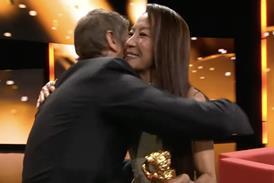Dir: Tom Tykwer. 2001. Germany/US. 97mins.
If Run Lola Run was Tom Tykwer's breakthrough film, then the Miramax-backed Heaven is his first big commercial test. The message that we are in very different territory from his smart and stylish 1999 indie hit is made clear in the posters plastering Tykwer's hometown of Berlin, where the film was chosen to open this year's festival. The words "from the producers of The English Patient" nestle between Cate Blanchett's head and a picture-postcard Tuscan landscape.
But Heaven is a frustrating film. Although it gets off to a nailbiting start, dramatic tension and emotional incisiveness are gradually frittered away to be replaced by those Tykwer standbys: great camera angles and a cop-out symbolic ending. Some of the film's problems have to do with Tykwer's occasionally uncertain direction of the predominantly Italian cast, but Heaven has a deeper identity crisis. It's a fast-paced cinematic thriller with a hankering after the slow emotional drama of the theatre - and this schizophrenia is never resolved. By the end, unaccountably distracted from what is clearly supposed to be one of the great screen love stories, audiences are likely to end up combing the rural interiors for useful design tips. With Cate and the Tuscan thing and the great photography' sure, it'll run. But it won't run and run.
The film is based on a screenplay by the late Krzysztof Kieslowski, the man who brought words like remorse and redemption back into cinema's vocabulary. And Heaven's harrowing mis-en-scene - cut in with the opening credits - is pure Kieslowski. With growing horror, we follow the inexorable unfolding of a skewed appointment with destiny, from the preparation of a homemade bomb (featuring some crafty Duracell battery product placement) through to the death of four innocent people.
Blanchett plays Philippa, the Turin-based English teacher who carried out the bomb attack in revenge for the death of a 13-year-old student and her estranged husband - both victims of the heroin put on the streets by signor Vendice, ostensibly a successful businessman. In police custody, Philippa is torn apart by the news that her revenge attack has claimed the lives of a family of three and an office cleaner while Vendice (Santospago) has emerged unscathed. During a series of police interrogations, Filippo, the cherry-cheeked, bedwetting young carabiniere who acts as Philippa's interpreter, finds himself falling in love with his emotionally ravaged charge. When it becomes clear that his superiors are covering up for the drug dealer, Filippo decides he will help her to escape.
So far so good - mostly. Blanchett's modulation from defiance to horrified remorse when she learns what she has done is beautifully managed, but at other times her delivery is too hoarsely mannered, as if she does not quite believe in the script. Giovanni Ribisi too initially hits the right notes as the conscience-stricken young cop torn between loyalty to his family trade (his father is a big-shot carabiniere) and doing the right thing.
It is when the two take refuge in the conveniently empty attic of Turin's central police station that the film starts to lose its dramatic grip. Frank Griebe's luscious photography caresses the two central characters, creating Vermeer-like tableaux which are held just a little too long. And when they escape via milk van and train to Tuscany, the hyper-real, tinted rural landscapes make us want to head straight for the nearest estate agent. But the relationship that unfolds behind and beyond the aerial shots and painterly set-pieces never approach the catharsis the director is striving for.
A soundtrack in which some pared-back solo piano pieces by Finnish composer Arvo Part and mood music by Tykwer himself alternate with large tracts of no music at all is effectively minimalist. But when the dialogue tries the same taciturn, minimalist trick - especially in the scenes between Filippo and Philippa - the effect is not so much to evoke reserves of unexpressed feeling as to suggest a lack of character development. The relationship between the two leads that started so promisingly in a welter of anguish, tender feelings and ethical dilemmas ends with backlit sex under a Tuscan tree (something already explored, with more honestly cliched intent, by Bertolucci in Stealing Beauty).
This is the second time, after the messy The Princess And The Warrior, that Tykwer has used the hold-hands-come-on-let's-do-it ending, as popularised in Thelma And Louise. Such a loaded trope, though, should be used not to deliver a conclusion, but to seal it - and Heaven just hasn't put in the groundwork.
Prod cos : X Filme Creative Pool GmbH, Miramax Film Corp
Int'l sales: Miramax Int'l
Prod: Anthony Minghella, Maria Kopf, William Horberg, Stefan Arndt, Frederique Dumas
Exec prods: Harvey Weinstein, Agnes Mentre, Sydney Pollack
Scr: Krzysztof Kieslowski, Krzysztof Piesiewicz
Cinematography: Frank Griebe
Prod des: Uli Hanisch
Ed: Mathilde Bonnefoy
Music: Arvo Part, Tykwer
Main cast: Cate Blanchett, Giovanni Ribisi, Remo Girone, Stefania Rocca, Stefano Santospago



















No comments yet